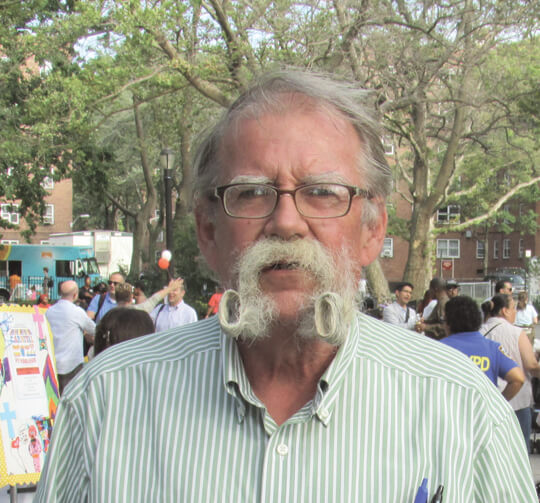Last month I wrote about District 51 Assemblymember Marcela Mitaynes’ proposal for a bill that “Establishes an indirect source review” for last-mile warehouses. This month, two members of Mitaynes’ team reached out to me to clarify what the proposal would accomplish.
“We believe it’s very important to update the community on what’s going on around them and we want to provide transparency on the environmental effects last-mile warehouses would cause in neighborhoods [not just in Red Hook,”] said Jenny Zhang, chief of staff for Mitaynes.
She also explained that even though a few places in the proposal referred to a 12-month period, this is not a one-year program. If the legislation is enacted, it will be permanent. However, Mitaynes’ team is giving the New York State Department of Environmental Conservation (DEC) one year to come up with rules and regulations.
“Another aspect is that it would also provide transparency on how many local workers are getting hired at the warehouses,” said Emmitt Mendoza-Gaspar, communications and organizing director for Mitaynes.
One question I had was whether or not the program would affect existing last-mile warehouses as well as the new ones.
“This would affect both new and existing last-mile warehouses,” Zhang said. Existing ones won’t have to go through the permitting process but they will have to report information. They would need to annually disclose traffic volume, total inbound/outbound vehicles per day as well as types of vehicles used [is it all trucks or is some cargo moved on bikes, waterways, or even drones,] how many workers, and if they are union or non-union workers.”
They also both explained that there would be no enforcement measures to make sure last-mile warehouses are hiring local workers but the goal is to make everything transparent so the community would know who’s getting hired.
Zhang also stressed that this would not trigger any changes to the zoning code since zoning is determined by the cities and right now the last-mile warehouses can build as-of-right.
“Our mechanism is through environmental policy and an environmental permit for indirect sources of pollution at a state level,” Zhang said.
Additionally, last month I spoke to community leader John McGettrick, who told me some of the key factors needed for the bill to be enacted including if the bill has been assigned to a committee and if so, which committee. Additional important questions include whether there will be a will be hearing held on the bill, and if so, when? Also, is there a companion bill with the same legislative components and is there a senate sponsor?
“The Environmental Conservation Committee is the assigned committee,” Zhang said. “And they haven’t decided to hold hearings on the bill yet but we’re hoping for that to happen as soon as possible. We need to generate sufficient public pressure and then the speaker would decide to hold a hearing.”
“There is no senate sponsor yet,” Mendoza-Gaspar said. “We’re evaluating what would make the most sense for the sponsor in the senate and what gives the bill the best chance of passing.”
“We’re not in session until January of next year which gives us some time to figure out how to put the bill on the strongest footing possible,” Zhang said. “In the meantime, we’ll be reaching out to colleagues and setting up meetings to try to figure out the best way to go about that.”
One of the big issues in communities with last-mile warehouses is that right now there is no clarity on the environmental impacts these facilities have on those communities. Mitaynes’ proposal attempts to get clarity on the effects of last-mile warehouses for neighborhoods that are suddenly home to these massive facilities including Red Hook.
Mitaynes answers McGettrick on warehouses, by Brian Abate

READ OUR FULL PRINT EDITION
Our Sister Publication
a word from our sponsors!
Latest Media Guide!
Where to find the Star-Revue

How many have visited our site?
Social Media
Most Popular


Big donors taking an interest in our City Council races

Wraptor celebrates the start of spring
Related Posts
Special birthday issue – information for advertisers
Author George Fiala George Fiala has worked in radio, newspapers and direct marketing his whole life, except for when he was a vendor at Shea Stadium, pizza and cheesesteak maker in Lancaster, PA, and an occasional comic book dealer. He studied English and drinking in college, international relations at the New School, and in his spare time plays drums and

PS 15’s ACES program a boon for students with special needs, by Laryn Kuchta
At P.S. 15 Patrick F. Daly in Red Hook, staff are reshaping the way elementary schoolers learn educationally and socially. They’ve put special emphasis on programs for students with intellectual disabilities and students who are learning or want to learn a second language, making sure those students have the same advantages and interactions any other child would. P.S. 15’s ACES

Big donors taking an interest in our City Council races
The New York City Council primary is less than three months away, and as campaigns are picking up steam, so are donations. In districts 38 and 39 in South Brooklyn, Incumbents Alexa Avilés (District 38) and Shahana Hanif (District 39) are being challenged by two moderate Democrats, and as we reported last month, big money is making its way into

Wraptor celebrates the start of spring
Red Hook’s Wraptor Restaurant, located at 358 Columbia St., marked the start of spring on March 30. Despite cool weather in the low 50s, more than 50 people showed up to enjoy the festivities. “We wanted to do something nice for everyone and celebrate the start of the spring so we got the permits to have everyone out in front,”




